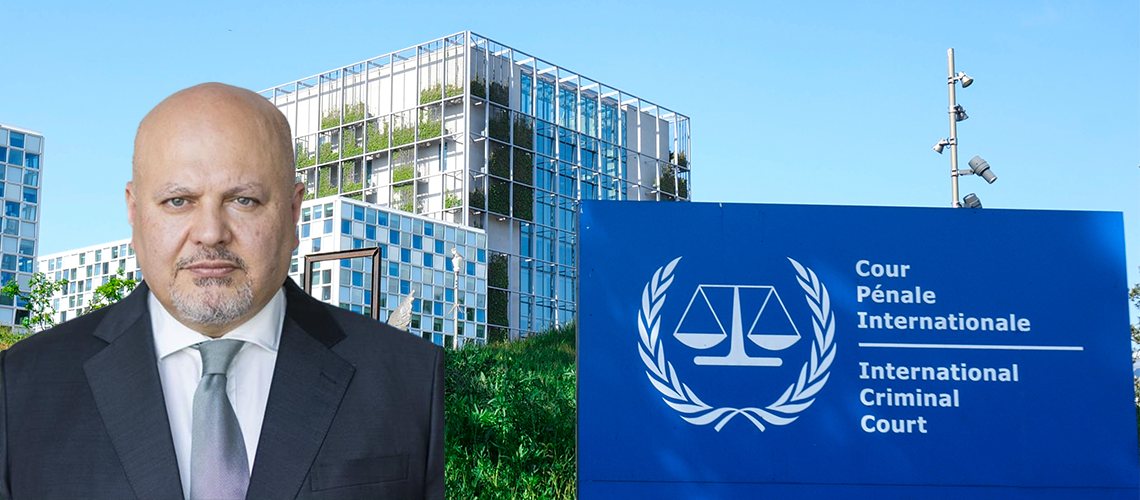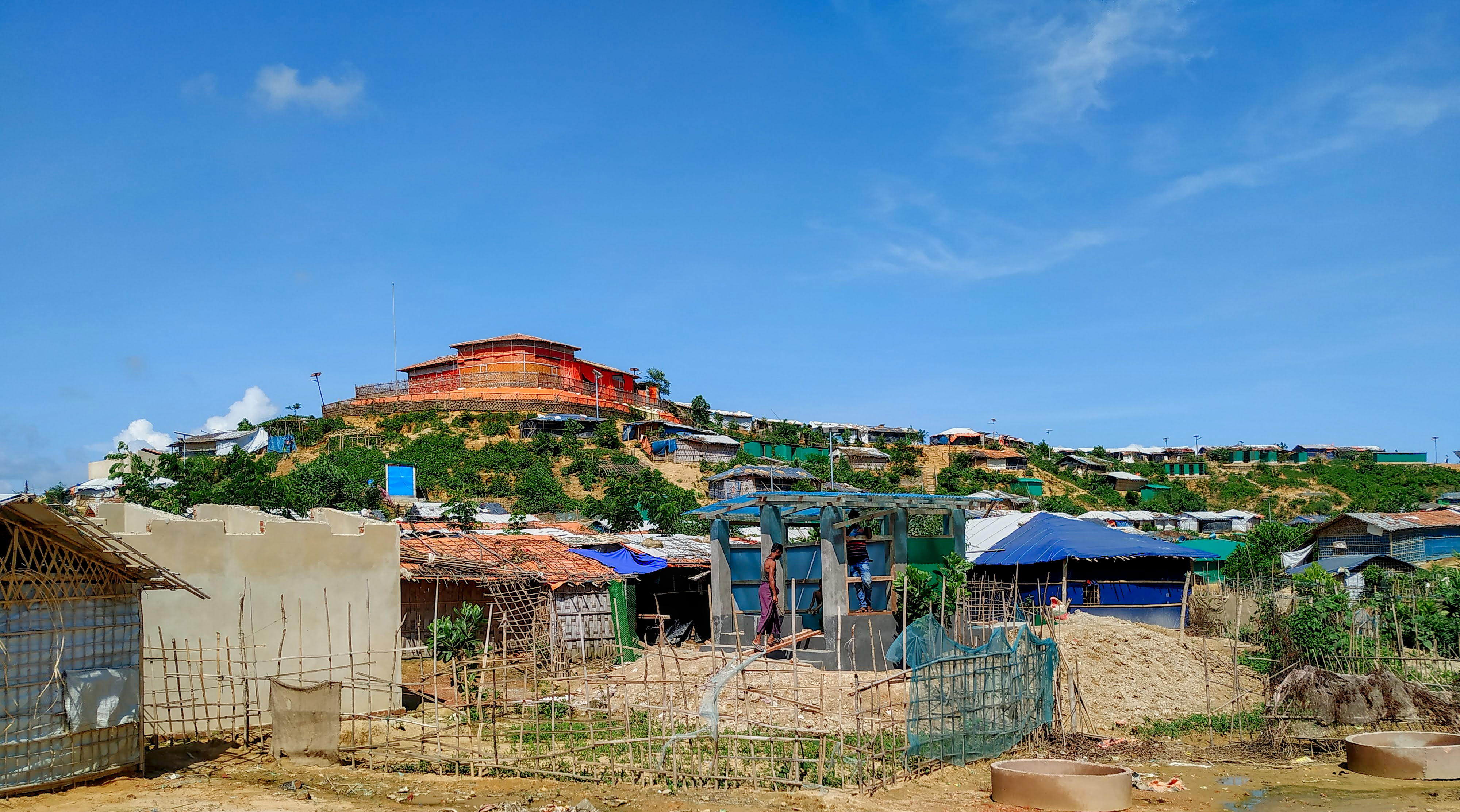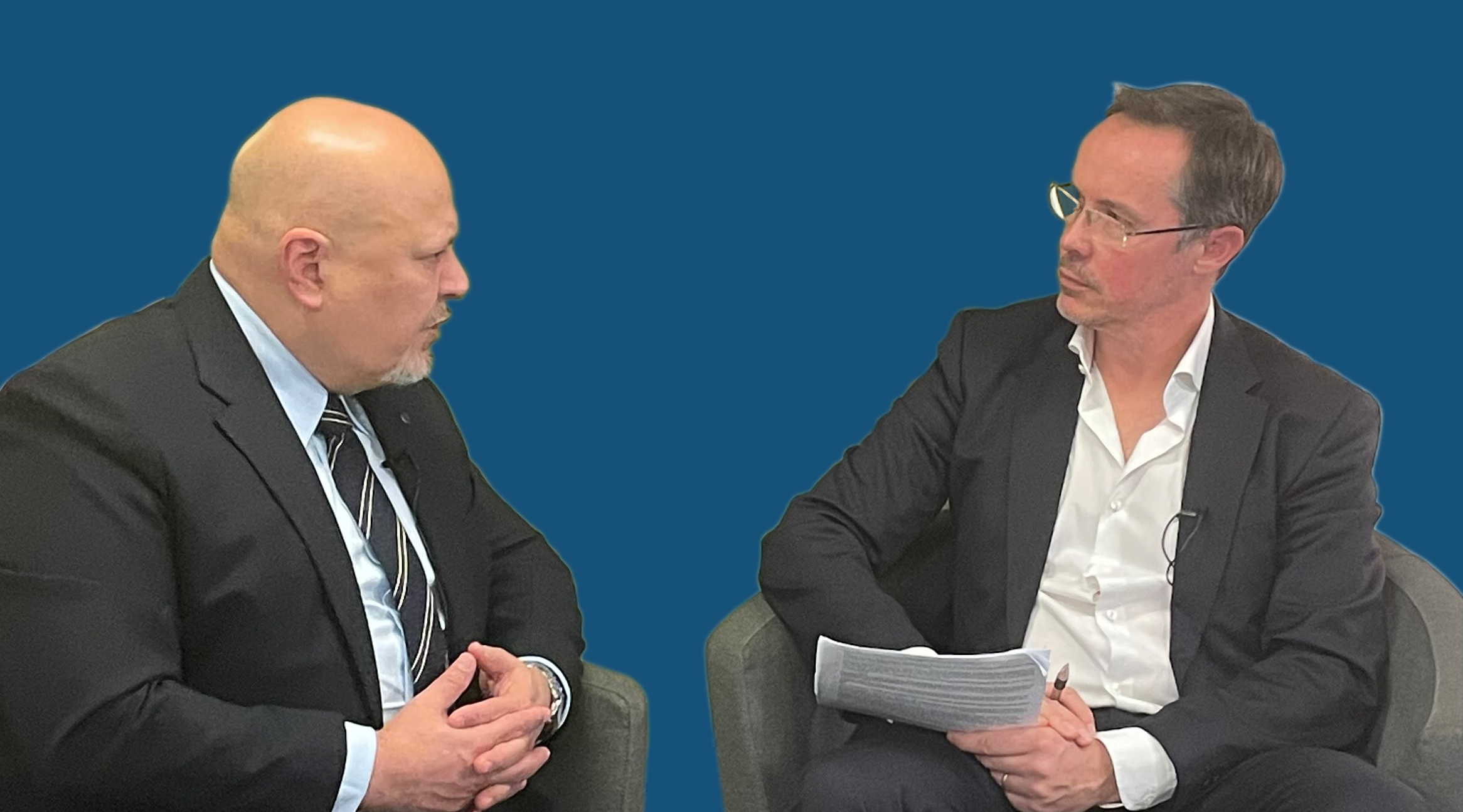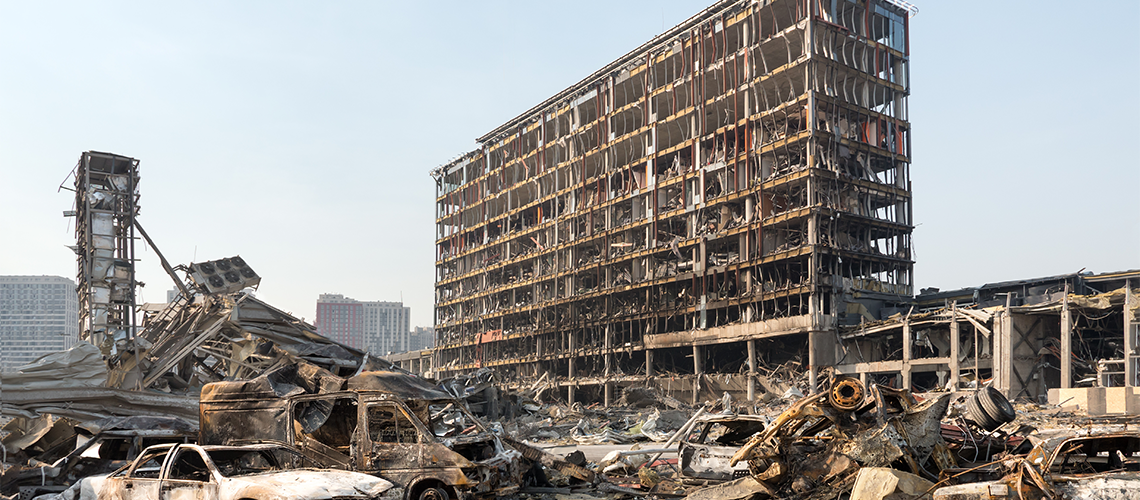Interview with Karim Khan KC, Prosecutor at the International Criminal Court
Monday 20 November 2023

Karim Khan KC has been Prosecutor at the International Criminal Court (ICC) since 2021. He spoke to the IBA’s Director of Content, James Lewis, about the challenges facing the Court, including its work on the conflicts in the Middle East and Ukraine.
James Lewis (JL): The ICC has been in existence for a little over 20 years. It would be great to get your view on the progress of the Court and the challenges facing you.
Karim Khan KC (KK): International justice is a work in progress. It's far from perfect, but it has latent potential. Before I was elected, there was an excellent report that Justice Richard Goldstone chaired, along with many other experts from all over the world, which identified areas of weakness and of concern to improve the operation of international justice, not only in my office but in the judiciary, in registry and elsewhere. And we've re-organized the office, we’ve made a lot of changes internally. We are trying to focus more on delivery in terms of being closer to the field, trying to work at the speed of relevance. We’re trying to also make sure that we don’t just have policy papers, but we implement them in practice. So, we’ve already, in the last 12 months, put forward a policy paper on gender persecution that’s already finding form in some of our investigations. In December, I will announce new policies on gender crimes and new policies on crimes against, and affecting, children. And we’ve just launched a month ago a new consultation paper on cooperation and complementarity. But the key issue is the imperative to make sure those policies apply in practice; and that’s the area that we’ve made some progress in. But, of course, there’s much more work to be done.
JL: Historically, there has been an anti-ICC sentiment from African states. Is that an issue of concern for you still?
KK: I’ve been delighted by the progress. I was the first prosecutor in 17 years invited to the African Union Heads of State Summit in 2021. And I went again this year, and I’ve been invited next year. We’re moving forward on multiple lines, both investigations in relation to situations and building complementarity like we have in the Central African Republic. But, of course, one can’t rest on one’s laurels. We need to keep forging new bonds. We do that by engagement, by listening and trying to ensure international justice is relevant to the states and to the regions of the world.
JL: You’ve spoken about the need for the ICC to be nimble and effective. How are you going about achieving that?
KK: We’re doing it by realising that from every perspective, including working at the speed of relevance, we have to be closer to the countries we're working in. So [we have a] field office now in Kyiv, we have a presence in Cox's Bazar in Bangladesh regarding the Rohingya. We’re opening offices in Bogotá and in Caracas.
I’ve given instructions that I don't want to have any team or situation without nationals from the countries concerned: a realisation that nobody knows the country better than people living in it and people from the region. And if we listen more and embrace that diversity of legal system and that specialised knowledge of the country, we’re less likely to be taken for the ignorant tourist abroad and more likely to have a more accurate compass that will help us build proper cases that will stand up to scrutiny in the courtroom.

Rohingya refugee camp, world's largest refugee camp. Sadek Husein/AdobeStock.com
JL: You’ve used the phrase ‘speed of relevance’ repeatedly. Can you be specific on what you mean by that?
KK: International justice isn’t only a normative value. It’s not only an inalienable right of individuals. It’s not only a function of the international principle. There’s no statute of limitations for war crimes. There has to be a more acute realisation that when people are in terror and fearing for their lives, the law has to be seen to be relevant to them. It can't be this approach that we take a decade before we move. We can't create evidence, we have to collect evidence. We have to make sure it's relevant and authentic. But it's an effort not to impose an arbitrary timeline, but to have enough purpose, a sophisticated enough strategy, to make sure that we are increasingly relevant and that those types of crimes that are ongoing can also be subjected to investigative analysis.
We see it in states and we see it in certain individuals very often – the default position can be inertia. States sometimes may not move due to the discomfort of change. But they may do so if it is put in stark contrast to pain. And very often the ICC dealing with individual criminal responsibility is an important tool to focus minds, to make sure that states have every opportunity to close the door to us. But to close the door to the ICC jurisdiction where we have it, it requires states to step up; and if states step up, I’ll step out. So, states are masters of their own destiny by complying with the law and properly investigating crimes. And that’s something I want to foster.
States are masters of their own destiny by complying with the law and properly investigating crimes. And that’s something I want to foster
The ICC is not a court of supervisory jurisdiction. We also need to be more willing to be a hub in which we can build our own cases when states are unwilling or unable, but we can also provide evidence and information to national authorities not only of situation countries, but of other countries that are willing to exercise universal jurisdiction or to try to join us in the quest of eradicating impunity and ensuring justice. That creates a more healthy and sustainable dynamic in which we also are more clearly relevant to national authorities.
JL: You've got serious situations: Ukraine, Sudan, Palestine and elsewhere. Your resources are spread thinly. Are they spread too thinly to meet the obligations laid down in the Rome Statute?

Karim Khan and James Lewis
KK: It's extremely difficult. I think the office has spread itself too thin over a number of years. I have to find a way to deal with what I’ve inherited in a principled manner. But I've also said even before I was elected, my vision of a sustainable ICC is we have to narrow the number of situations, but go deeper. If you look at it from a resource perspective, the amount of effort, time, money [you need] to have, the language skills, the analytical skills [regarding] a particular country is quite immense. And if you only do two or three cases and move on it’s not really sufficient to move the dial of accountability in a discernable manner. Whereas if one goes deeper and has 30 cases or 20 cases or ten cases, maybe you can either help the national authorities or do it yourself to extract the poison of hate or criminal responsibility that can allow a country to get back together in terms of reconciliation, for the sake of argument. And that requires justice. So that's going to be something we have to do over a number of years. But at the moment I still have to deal with what I've inherited effectively.
For the first time I’ve used the provision of the Rome Statute for voluntary contributions, not earmarked to any situation. That’s had some success. But there’s a primary responsibility on the Assembly of States Parties to properly fund the Court that they’ve created. And so far I think they could do much better. And it'll be interesting to see what happens in New York at the Assembly of States Parties in December, because in the last 12 months we've seen significant flare-ups. Of course, Ukraine is an ongoing battleground and we have an active investigation there. The people of Darfur have had yet another upsurge in violence in which there’s many allegations against different communities. The mass killings, for example, seem to be particularly targeted. We're looking into that and ongoing violations. And of course, we see over the recent weeks the terrible events in Israel and in Palestine. And for us to vindicate those rights and discharge our responsibilities to investigate, we need the funds, the resources, the tools from states. So, the mantra of mine is: give us the tools and let us do the job. But it's not sustainable for us to talk a good talk, or for states, foreign ministers, ministers of justice or heads of government to talk a good talk about the principles of international law when we are so under-resourced. And that's something that couldn't be more vivid at this moment.
If you only do two or three cases and move on it’s not really sufficient to move the dial of accountability [in a jurisdiction] in a discernable manner
JL: You’ve described Ukraine as a crime scene. The crimes are widespread and extensive. You don't have infinite resources. So how do you focus the ICC efforts in Ukraine?
KK: You make decisions, which must be informed by many factors: the gravity, the availability of evidence and the need to work at the speed of relevance. This is exactly what we've done in relation to Ukraine, in relation to the public warrants, because of the admissions effectively made by individuals in the Russian Federation, particularly President Putin and Children’s Rights Commissioner Maria Alekseyevna Lvova-Belova. We investigated crimes against children and we move forward. And that's the basic approach anywhere else: we look at the most serious crimes. When there's more than one serious crime, we also look at the types of evidence available and start moving. And then we can go deeper, if and when necessary and if and when justified by the evidence.
JL: And you're supporting prosecutions occurring in Ukraine?
KK: We're independent, of course, impartial, but we're working with Ukraine. We're helping them with a forensic rotational model that is under the flag of my office and the ICC, in which we're giving them technical support. They’re also helping us in terms of providing information and we're scrutinising it to make sure it’s accurate, reliable and truthful.
For the first time I'm part of a joint investigative team with many countries under the rubric of Eurojust [European Union Agency for Criminal Justice Cooperation] in The Hague. We're doing it not just in Ukraine. We've done the same in Libya with the United Kingdom, the Netherlands, Spain, Italy and Europol [European Union Agency for Law Enforcement Cooperation] in terms of human trafficking and that's already led to three arrests. Those individuals are being prosecuted in the courts of Italy and the Netherlands, and we've given evidence that has led to those arrests. It doesn't matter which flag is behind the judges – the ICC flag or a national flag – what we need to do is to really show that we're more than talk collectively - at the national level and at the international level.

Damaged building in Ukraine due to a terror attack bomb shell in a civilian area. Алексей Синельников/AdobeStock.com
JL: What is the significance of the arrest warrant against President Putin – is it symbolic or is it a statement of intent? It seems unlikely we'll see him in a court.
KK: It's not symbolic. It's tragic. It's tragic from every vantage point. That a permanent member of the UN Security Council and a country of such history of art and music and literature has a head of government that has had a warrant issued against him for war crimes, brings me no joy. But states have decisions to make. Do they want to pursue a course in which they disregard international law? Or do they realise that compliance with the law, notwithstanding the imperfect application of the law previously in other situations, but the application of the law with more fidelity, is in the national interest. These events challenge leaders. What do they put first: individual interest, political aspirations, dogma, ideology or the interests of humanity and their own people?
What I would look at is: are there other historic situations that were intractable? Former Liberian President Charles Taylor was head of government. Slobodan Milosevic was head of government as President of Serbia. And people thought what a ludicrous court it is that has the audacity to indict former President Milosevic or Charles Taylor. How could a court with no police arrest these people who were heads of government with armies? And yet history shows those individuals were subjected to appearance before independent judges. And there were trials and processes and, for example, Charles Taylor was convicted and is in prison.
JL: So you don't rule it out for Putin?
KK: Time is a wonderful thing. I don't know what will happen next minute, without knowing what will happen in a month or a year or a decade. We do what we can do based upon principle and evidence, and then time creates opportunities or not.
Hopefully it becomes a bit starker to states that we can't continue in this direction, of not giving sufficient regard to human life
JL: In the Middle East, the ICC was already investigating possible war crimes and crimes against humanity dating back to 2014, perpetrated by Israeli armed forces, Hamas and other Palestinian groups. What have recent events changed for the ICC?
KK: Well, the jurisdiction remains, of course. The jurisdiction also has been rendered even clearer in relation to missile attacks from Palestine into Israel that may constitute violations of the Rome Statute in terms of intentionally targeting civilians. We've added to the issue of the state nationals and nationals with States Parties committing crimes on the territory of Israel. If that's proved, we have jurisdiction in relation to 7 October. But we see the devastation in Gaza at the moment. We see the upsurge in settler violence by Israeli settlers against Palestinians in the West Bank. We see misery on all sides.
We’ve got to make sure that the law is not seen to be an optional extra. I just came back from Rafah [the Gaza–Egypt crossing]. I gave press conferences in Cairo. I met Israeli victims whose loved ones were killed on 7 October, or they’re hostages. And I've spoken to Palestinians that are suffering the most awful conditions. And when Gaza Strip is under bombardment, we've got to find a way to make it clear that these are fundamental legal obligations that every state authority or individual non-state actor must comply with. And we need to find a way to deliver on it. And it's not going to be easy, but it requires stamina. It requires resolve, determination and building partnerships as well.
This goes back to the key issue. The Court is as strong or as weak as the cooperation that we get. But there are imaginative ways across all our situations in which the office is trying to move forward, realising the difficulties that we're in, but also that hopefully it becomes a bit starker to states that we can't continue in this direction of not giving sufficient regard to human life, because hate begets hate and hate begets violence and violence causes instability, insecurity and even wider conflicts, as history tells us. And so, we need to learn those lessons of history and act accordingly and change course from the direction in which we are travelling internationally, which is towards more conflagrations and more suffering.
This is an abridged version of Karim Khan KC’s interview at the IBA Annual Conference in Paris. The filmed interview can be viewed in full here.
